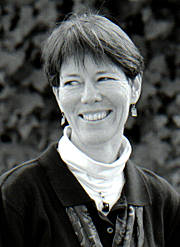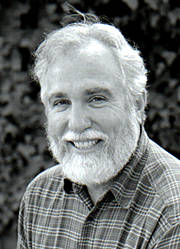| SOIL,
FOOD, & PEOPLE CONFERENCE
March 27-29, 2000
GROW BIOINTENSIVE conference on the U.C. Davis campus
Home
| Intro | Presentations
| Breakout Sessions | Friends:
Old & New | Sponsors
PRESENTATIONS
Optimal Genetic Diversity
Raoul Robinson | Hope
Shand | Kent Whealy
 |
Raoul Robinson was formerly with
the U.N. Food and Agriculture Organization. He trained in agricultural
botany at Reading and Cambridge Universities, has worked mainly
with crops in developing countries and is the author of several
books on plant pathology. |
Robinson said that for the last 100 years scientists
have been breeding agricultural crops. However, for 9,000 years
farmers themselves have been successfully breeding new plant cultivars.
Scientific crop breeders had 4 goals - to increase:
- yields,
- quality of product,
- economic sustainability, and
- resistance to pests and diseases.
Robinson believes that they have succeeded in
the first 3 goals but have been "disastrously unsuccessful"
in the last one. He cites the reason as being the domination of
the science since 1900 by Mendelians, who base resistance control
on a single gene.
The problem with this system is that it quickly
breaks down - a type of "boom and bust" - so that that
particular cultivar has to be replaced with another in just a few
years. As a result, in the 1960's plant breeders decided they weren't
going to deal with resistance anymore. They would leave it to the
plant pathologists and entomologists. He believes that is why crop
protection chemicals now have to be used in such great quantities.
Robinson stated there is another type of resistance
control, based on poly genes. This type of cultivar will never break
down and will only get progressively better until it reaches a plateau.
Plant breeding for resistance with poly genes is also very easy
and can be done by anyone.
He mentioned that one of his books, Return
to Resistance, discusses plant breeding clubs. He hopes that eventually
there will be thousands of plant breeding clubs worldwide, each
one producing the best cultivars for its own ecosystem. When this
happens, he feels this process will go a long way towards eliminating
chemicals from crops.
top
 |
Hope Shand is the research director
for the Rural Advancement Foundation International. She writes
on the topics of agricultural biodiversity, as well as the social
and economic impacts of new biotechnologies. She is editor of
RAFI Communique and author of Human Nature: Agricultural Biodiversity
and Farm-Based Food Security. |
Shand mentioned 3 trends she sees as challenges:
The first is an unprecedented rate of erosion of crop genetic resources,
animal species, tropical forests, soil and biodiversity. This cannot
be separated from the breakdown of human cultural diversity: the
loss of traditional farming communities, languages, indigenous cultures,
all on a massive scale. With this loss we also lose scientific information,
innovative capacity and traditional knowledge.
The second trend is privatization of plant genetic
breeding resources and seed sales. She cites gigantic transnational
enterprises which have gained unprecedented control over patents,
food security, farming and health. Shand notes that 20 years ago
there were thousands of seed companies, most of which were small
and family-owned.
Today the top 10 companies control one-third of
the $23 billion commercial seed trade. The same companies now dominate
in all sectors: plant breeding, pesticides, veterinary medicines
and pharmaceuticals. Fewer companies are making decisions about
the future of agriculture worldwide.
The third trend concerns farmers and their role
in using and conserving agricultural biological diversity. In the
long run they are the ones that crop biodiversity depends on, particularly
those farmers in marginal areas.
Shand is alarmed at the erosion of their rights
to save seeds and breed their own crops. This is important because
farmers are plant breeders who are continually improving plants
to fit their own specific conditions. She sees this as the key to
maintaining food security and points out that corporate breeders
are taking out patents on the modification of plants that were originally
developed by farmers over the centuries.
top
 |
Kent Whealy
is the director of Seed Savers Exchange, a nonprofit grassroots
network of gardeners, orchardists and plant collectors whose
efforts are saving a significant part of the genetic diversity
of our planet.
Kent has traveled globally to save
thousands of endangered species and is the editor of The Garden
Seed Inventory and The Fruit and Nut Tree Inventory. These
invaluable resources are periodically updated and revised.
They list all the open-pollinated varieties in the United
States that are not extinct and give sources for obtaining
seeds or saplings for these varieties.
|
Whealy started by saying he was glad to be present
on such a "momentous occasion." Then he spoke of the irreplaceable
nature of our genetic wealth, which can only live in living systems
and can disappear in a year. These resources provide a thin line
between us and worldwide starvation.
Whealy traced his involvement with heritage seeds.
It all began 25 years ago when his wife's grandfather gave them
2 varieties of seeds he had brought with him from Bavaria. At the
same time, he read about the erosion of genetic diversity that was
accelerating worldwide.
He realized there must be a tremendous heritage
of heirloom varieties in the country which had been passed down
in families. Immigrants always brought the best of their seeds with
them to provide a tie to their place of birth and to allow them
to eat foods they were used to.
He placed ads in gardening and back-to-the-land
publications, trying to locate more of these seeds and found there
were real "treasure troves" of seeds available, particularly
in isolated areas like the Smoky Mountains.
Today, Seed Savers puts out a 500-page yearbook
listing a network of 1,000 people who have about 11,000 varieties
of seeds not offered commercially. Whealy is pleased that Native
Americans are gradually starting to offer their seedsÑthese
"sparks of life"Ñ to this network.
Seed Savers Exchange, located on a farm in Iowa,
maintains about 18,000 varieties as a central backup collection
for its members and grows out 2,000 of these each summer. Whealy
ended his presentation with a beautiful and inspiring slide show
of some of the amazing varieties of vegetables they have grown out
from their heritage seeds.
top |